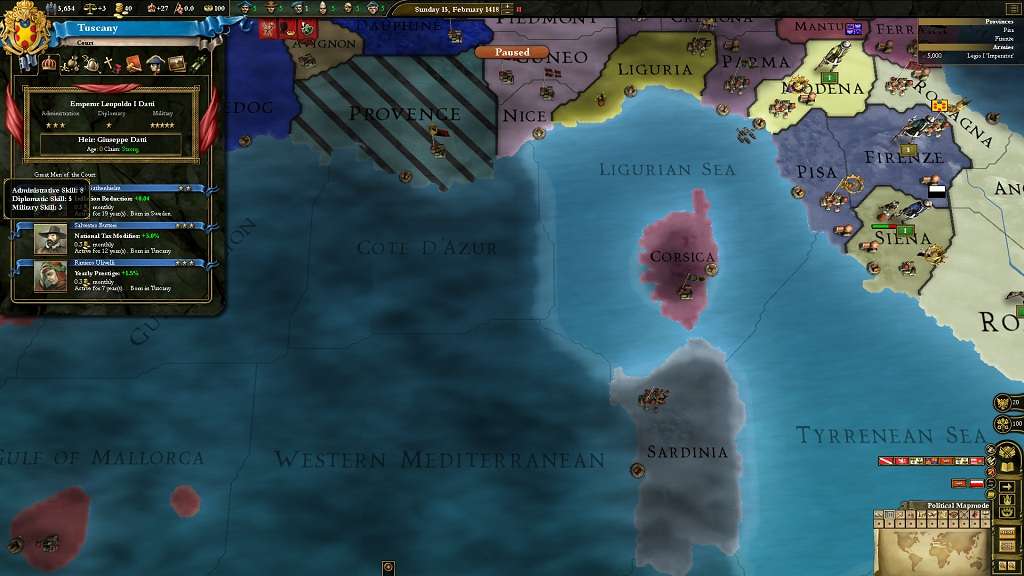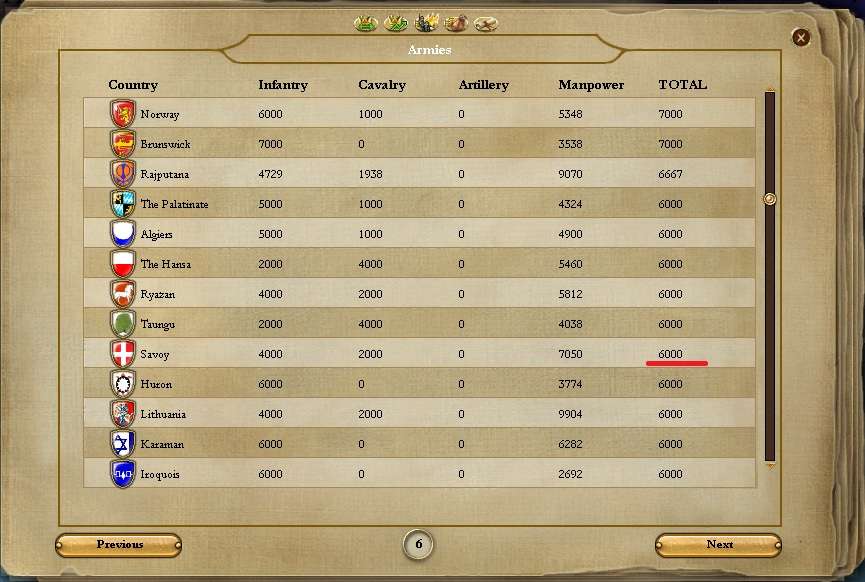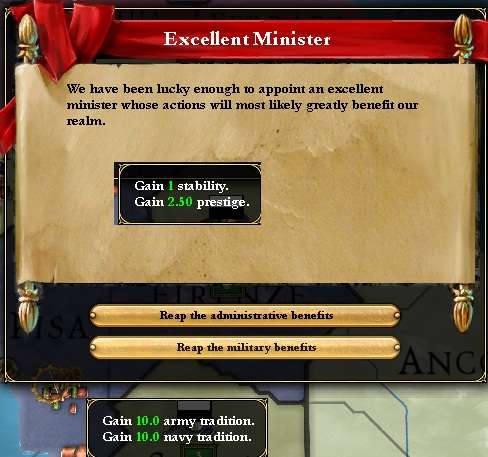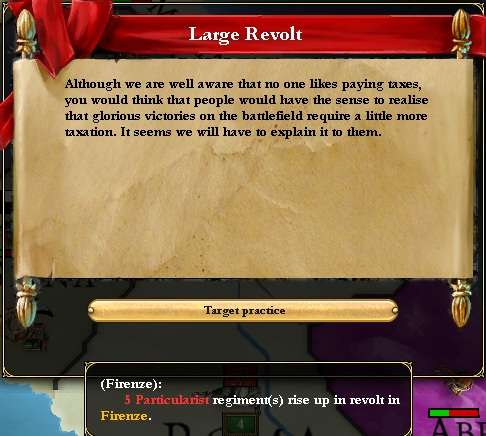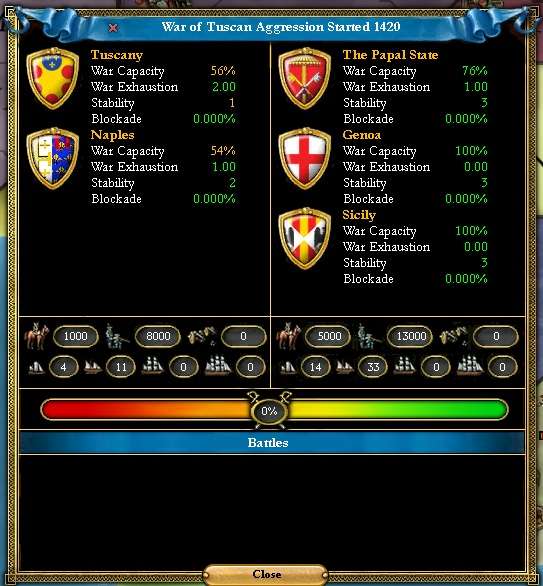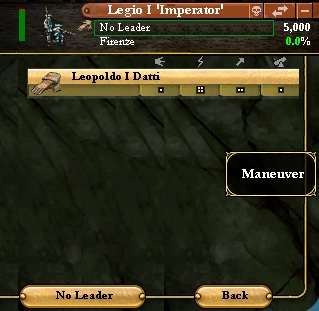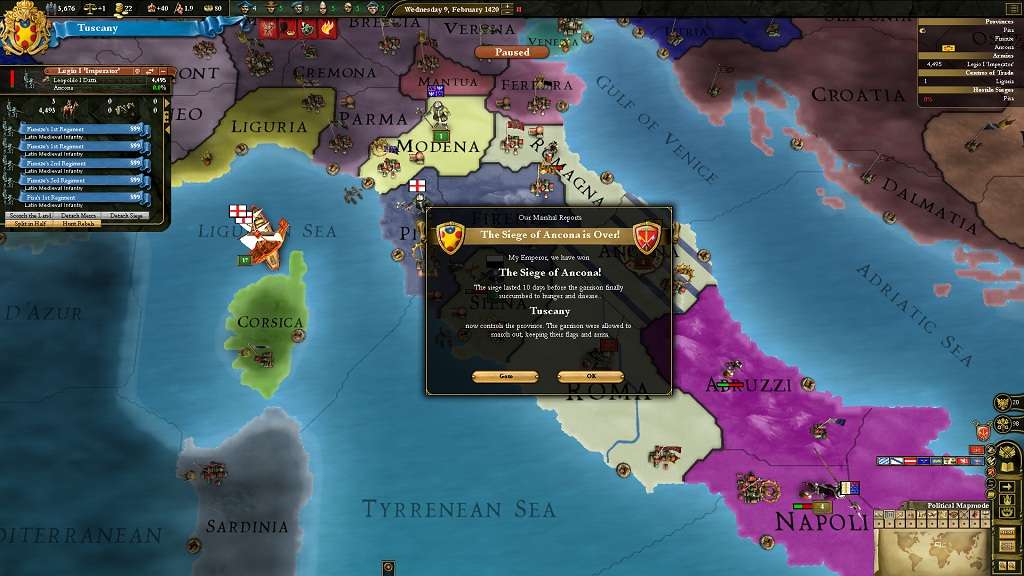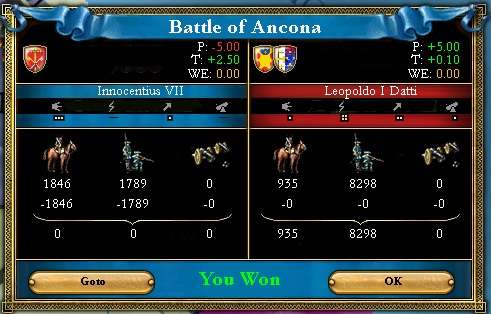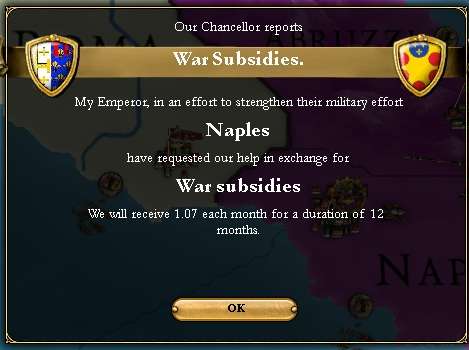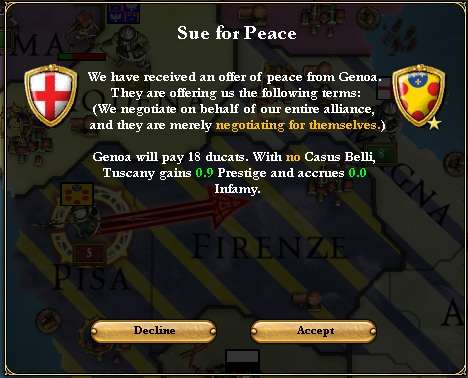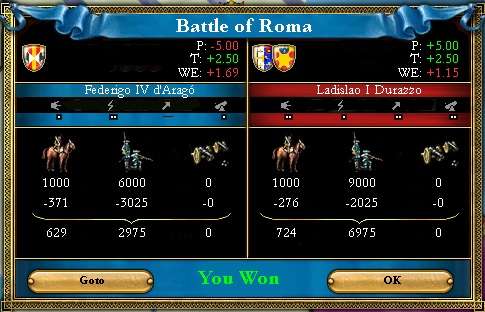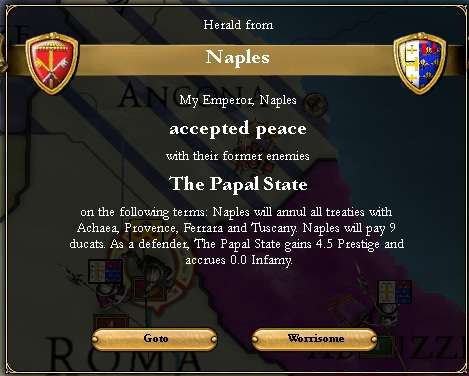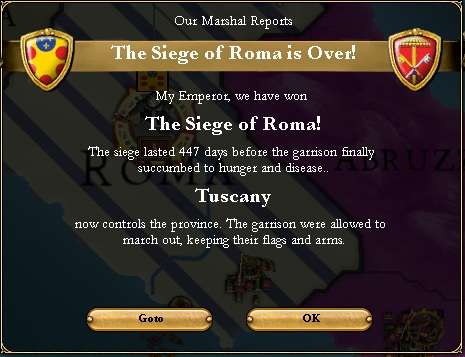Chapter 4: The Lion goes to war!
15 February, 1418, a newly furnished room in the Imperial Palace
Leo I, newly crowned Emperor of the Tuscan Empire, stood over a map of Tuscany.
Seated around a newly constructed table -- everything in this room was new, and it featured some of the latest arms and armor from around the world, with a bust of Emperor Maso I sitting just below a portrait of the new Emperor. Curled at Leo I's feet in the portrait was a lion. Even though Leo had never even seen a lion before, he understood how important symbols were to the people. The coincidence of his nickname had caused many around Florence to refer to him as "The Lion of the Empire", or just "The Lion." The nickname pleased the Emperor, and quietly let it be known that he would not object to this nickname being used in unofficial reports, histories, and communiques. In any official documents, he would use his full name -- Emperor Leopoldo I -- but his closest friends and advisers just called him Emperor Leo.
The Emperor noticed Marcus Tullius Cicero, Imperial Chancellor, enter the room. Leo I motioned Cicero over to the table.
"Cicero, my friend, it is good to see you! How is young Agrippa?" It was not common for a
cognomen to become a
praenomen, but Marcus Vipsanius Agrippa's brave death in the defense of Florence in the war against Pisa made him a legendary hero -- despite some reports that Agrippa was initially less than loyal to the Empire -- and many Tuscan nobles had named their sons after him. [1] Cicero was one of them, as he had personally known the hero quite well and served as his deputy.
Cicero grinned as only a father could when talking of his son. "He is very well, my Emperor. He and Prince Giuseppe" -- the official title of the Heir to the Throne was Prince of the Empire -- "are quickly becoming fast friends. I like what you've done with this dusty old room; in truth, I never knew it existed until you started cleaning it out."
It was the Emperor's turn to beam. "I think I shall call this the
Camera Bello -- it is convenient to have all the important maps and documents in one room."
Cicero frowned slightly. "Chamber of War, Emperor Leo? Is there perhaps something I should know?"
Leo shook his head and waved his hand, dismissively. "Not yet, Chancellor Cicero, but a strong Emperor must always look for opportunities to expand his Empire. I have not forgotten my father's dream, of some day reuniting the former Roman Empire under one flag. I doubt very much it will be accomplished in my time, or even in the time of our grandchildren, but someday, the history books shall write of the glorious Novum Romanum Imperium -- the New Roman Empire. I did call you in here, however, to discuss possible options for expansion in the future. We are only awaiting the Marshal of the Empire's arrival."
A few minutes later, while Cicero and the Emperor pored over the map, a tall grey bearded man with a slight limp entered the room. Marcus Porcius Cato Maior -- his father had died quite recently -- was given the official title of Marshal of the Empire when several upstart officers in the First Legion refused to salute him or even acknowledge his orders. Marshal Cato had also inherited his father's title of Duke of Pisa, but he rarely used it; when he was not helping with the army, he was playing with his own young son, Sextus. With his wife dead in the same tuberculosis outbreak that killed his father, all Sextus had was his father, Cato the Younger.
"Emperor Leo, Chancellor Cicero, I am sorry I am late. Sextus is quite a handful at times, and I prefer not to leave him alone."
Both men nodded at the Marshal, thinking to their own sons, and knowing how difficult life could be, even with wives who actively supported their children. Alone, Marshal Cato's task was infinitely greater.
"You know, Cato, your sister is always bothering me about seeing her nephew, and we would be delighted to have him here at the palace. Perhaps you should speak with her after our meeting?"
Cato ruefully grinned; he had not seen very much of Lucia since she had become Empress. Rarely had he known a woman as proud or as brave as his sister, and he knew she was a tremendous asset to her husband. "As always, my Emperor, you are right."
Leo I nodded, then got down to business. "Gentlemen, I have called you here for some thoughts on ways Tuscany might expand. We must stick to the Peninsula for now -- I have not yet found the funds to construct a fleet appropriate for any invasions."
The Marshal gestured at the map with one hand. "We have three neighbors -- Modena, the Pope, and Siena. Our ally Naples would be a valuable addition to any campaign, as they have a significant army and the beginnings of a fine navy."
Cicero spoke at this point. "Siena has some powerful friends, among them, the Duke of Burgundy. Wars in France tend to keep Burgundy occupied, but a full scale invasion of Italy is something we cannot risk. Modena and the Papal States are more reasonable targets, I think, if you wished to expand."
The Emperor carefully weighed his options. "For now, I think, we wait. Have our ambassador in Naples pass along word of Papal troop movements; we can see those of Modena ourselves. You are dismissed; enjoy the rest of your day."
Both men bowed, with the Marshal adding a salute, then departed. What they did not know was that the Emperor had already made up his mind; he was just waiting for the perfect opportunity to strike.
------------------------------------------------------------------------------------------------
28 March, 1418, a dispatch from the Chancellor to the King of Siena
Dear King Gaspare I,
I hope this letter finds you well. We want to assure you that Tuscany has no designs on the soil of Siena; our quarrel was over our rightful claim to Pisa and with the previous ruler. You are of a different dynasty, and we hope that Siena and Tuscany can be friends. As a first step in this process, we Guarantee your independence; if any foreigners set foot on your soil, you need but ask and we will place the Legio I 'Imperator' at your disposal. We hope for fruitful relations in the future.
Sincerely,
Count Marcus Tullius Cicero, Chancellor of the Empire
------------------------------------------------------------------------------------------------
9 May, 1419, the War Room
The Emperor was carefully examining a report on the armies of Europe, when Cicero burst in, with Marshal Cato following quickly after. Cicero spoke first.
"Emperor Leo, the Pope has excommunicated the ruler of Savoy!"
The Emperor immediately dropped his report and gave Cicero his full attention. "That is interesting news, Chancellor. Marshal Cato, what do we know of Savoyard capabilities?"
Cato went to a desk, opened a drawer, and retrieved the following report, after making a mark with his pencil.
The report he saw
"Emperor Leo, they have a slightly larger army than we do, but with our allies, this may be a war we can win. I will try to gather as much intelligence as we can; I would recommend the Chancellor secure transit rights through Modena and Milan as soon as he is able."
The Emperor agreed, and the Chancellor was off to his office; both countries agreed, although it took a few weeks to receive a reply. With no available diplomats, the Emperor could do nothing in the short term; he would have to wait patiently.
-----------------------------------------------------------------------------------------------
9 September, 1418, the office of the Imperial Chancellor
Cicero and Cato had been mulling over employment applications for days now; both the Marshal's office and the Imperial Chancellery could always use talented ministers, but there were always many more applications than there were positions. Although they had different departments, both Duke Cato and Count Cicero often worked together to sift through the applications.
"What do you think of this one, Marcus Tullius? He's been educated in France and knows at least three different languages."
Cicero glanced briefly at the piece of paper before smirking and throwing it away. "Marcus Porcius, the only education he has from France is from a street whore or two. This one has applied at least eight different times, and his 'qualifications' are improving all the time. What about this fellow? He's served in six campaigns in the Germanies, seems to be a seasoned veteran."
Now it was Cato's turn to scoff. "You what I find interesting? That I've never heard of any of these battles, except one, and that was a huge defeat."
Cicero had stopped listening; he'd found a tremendous candidate, and shared it with Cato.
"Although I could certainly use this man in my office -- he would bring prestige to the Empire -- I think he would be better served as a member of your staff; before he was an ambassador, he was a general for the French army."
Cato greedily took the application, and chuckled to himself. "Cicero, I cannot help but agree."
------------------------------------------------------------------------------------------------
3 November, 1418 -- the Imperial Throne Room
Leo I was a little frustrated. Giuseppe was still a very small child; not yet a year old. He could not help but notice that his young son had no interest in the toy soldiers that had fascinated Leo as a child. His son was exceptionally bright, there was no doubt about that, but the only time that Giuseppe seemed interested in his surroundings was when Cicero was in the room. He confided his irritation to Lucia, complaining that the future Emperor needed to be a strong warrior. Lucia wisely counseled him to let Giuseppe choose his own path; not all men were born to carry the sword, and yet lived useful and productive lives.
With his thoughts eased, Cicero brought in a report from Savoy. Leo had asked him to prepare a list of allies that might answer Savoy's call -- with the return of the ambassador from Milan, they could declare war at any time.
"My Emperor, Baden, Hesse, Venice, and Austria would all likely support an attack on Savoy. Naples has proven eager to help, but I am worried that Austria, in particular, might have friends of her own. I must advise against acting in Savoy at this time."
The Emperor scowled, but knew Cicero was right. There would come a time when Savoy, with most of Europe, would bow to the Imperial throne, but not yet, it would seem.
-------------------------------------------------------------------------------------------------
11, March 1419, the War Room
When the Emperor called this meeting, Cicero and Cato knew there would be no pleasantries, asking after each other's sons, or any of that. The Emperor's summons had been too forceful for that.
"Thank you both for coming, Duke Cato and Count Cicero." Both men glanced at each other; rarely were their noble titles ever used unless the Emperor had something unpleasant to say.
"My friends, I have decided on our course of action, and I plan on war as soon as some other loose ends are concluded. Cicero, thank you for your earlier report on the independence of Corsica, and I appreciate your quick action in sending a small gift to Siena; we may need their assistance in my next plan. I propose war with the Papal States."
Cicero scratched his head, then asked, "Of course, my Emperor, but why the Pope? The current Pope has proven to be friendly to Tuscany, and the rest of Europe would not look kindly on an attack on the Pope."
Wordlessly, the Emperor handed a note to each of them, with the Papal seal upon it.
Leopoldo, Emperor of the Tuscans and child of God,
A Chinese trader visited St. Peter's yesterday, and a member of his entourage shared a terrible secret with me. It is not proper to share this secret with you in a letter, but I can tell you that, unfortunately, I cannot allow the burial of your father in consecrated ground. One of my agents has commenced the process of exhumation; as a sign of respect for you and your father, we will re-inter the body in any other cemetery you choose, but he cannot be buried anywhere in Rome.
Go with God,
Innocentius XVIII
Cicero looked puzzled after finishing the letter, but Cato blanched visibly. He, alone in the Tuscany, knew exactly what the Pope was talking about. The Emperor noticed his reaction, and with barely controlled fury, asked what the Pope could possibly mean.
Cato took a deep breath, and recounted the tale of Emperor Maso I's final days.
Leo I lost his temper; he actually ripped one of the swords off the wall and hurled it with tremendous force at Cato, who was saved from a very sudden end by his old soldier's reflexes. "WHY DID YOU NOT TELL ME? HOW COULD YOU KEEP MY OWN FATHER'S SUICIDE FROM ME?" The Emperor was about to call for the guards to have Cato arrested, when Cicero placed a restraining hand on Leo's shoulder.
"My Emperor, before you do anything rash, I may have a solution. Who determines Catholic Church doctrine?"
The Emperor, his fury slaked for just a moment, answered, "The Pope, Cicero. Where are you going with this?"
Cicero knew that his reply could mean the life or death of an old friend, so he carefully composed his words. "Perhaps the Pope's authority should not be absolute, then. We all know there have been times in the past when enterprising Popes have exceeded their authority, and Popes are, after all, human. Perhaps the head of the Tuscan Church should be -- you, Emperor. You would be free to determine what is and what is not a mortal sin, and you could bury your father wherever you pleased."
Leo was stunned into silence. He had not thought of this solution, and he found it appealed to him. Cicero nodded to Cato, who ventured the nerve to speak up.
"There is a military dimension to this as well; perhaps if the world knew of your quarrel with the Pope, you could freely annex Papal lands without too much of a stigma. We cannot reform the Roman Empire without Rome, correct?"
The Emperor nodded very slowly. He dismissed Cicero from the room, and spoke with Cato in private.
"Marcus Porcius, perhaps I was a bit hasty in my judgment, and for that I apologize. It would seem I have some of my father's temper after all. But why would you keep this terrible secret from me?"
Cato responded, with tears in his eyes, "Because I swore an oath to my father before he died. He feared that, if you were too young, it would destroy you. I was not to reveal the secret until I was certain you had the courage to accept it. The last few days of your father's life were not pleasant ones, my young Emperor, and the Chinese doctor administered the medicine without telling any of us. However, I believe that your father did know, and agreed. Sometimes these Orientals are wiser than they appear."
Leo could barely hold himself from crying as well, simply nodded once, and embraced his former tutor and life-long friend. The Pope was to blame here, no-one else.
--------------------------------------------------------------------------------------------------
27 May 1419, the office of Sheriff Salvestro Butterius
When the Chancellor himself strode into your office, you knew you were in for a bad day. But when the Chancellor
and the Emperor entered together, many peasants said you had best make your final arrangements.
Cicero threw a report on the desk of the Sheriff; although he was no longer Minister of the Interior, he had kept his title as Count and remained a trusted adviser.
The Sheriff knew this might happen. "My lords, when you directed me to Centralize control even more, I expected some miscreants might take to the streets to defy your authority. I have already alerted the Commander of the First Legion to be on the look out for trouble, and I have every confidence these rebels will not last long."
The Emperor underlined a single word with his finger. "What is 'particularist', Sheriff? I know the rebels in my father's reign were usually pretenders to the throne, but what do these fools want?"
"Emperor, these men want to divert authority back to their local magistrates; they feel you have taken too much power in your own hands."
Cicero shook his head violently at this. "Sheriff, my Emperor, we could not allow this to happen; we must have a strong centralized authority or else we cannot efficiently collect taxes."
The Emperor concurred, and signed an order to the Legio I 'Imperator' to hunt down these rebels and hang each and every one.
On the way out, the Emperor asked Cicero about the progress towards war with the Pope.
"Emperor, I have recently notified the Pope that we will no longer require military access to his lands. I did want to caution you that Genoa and Sicily have pledged support to the Pope in any conflict; perhaps you should wait a bit longer until you strike, until we can ascertain our own ally's opinion."
At this, too, the Emperor concurred, and both men went their separate ways, each deep in thought; Cicero, about the diplomatic niceties of the situation; Leo I, about the plan he would use to defeat the Pope's army.
------------------------------------------------------------------------------------------------
5 January 1420
A young farmer ran excitedly to his parents, waving a proclamation in his hands from the Emperor himself. "Mother! Father! The Emperor has made an announcement!"
The farmer's father, an old weather-beaten soul, scowled at his son. "You know I can't read those chicken scratches; read it to me, you dolt!"
The son, momentarily taken aback, began to read aloud from the proclamation.
To the people of Tuscany,
As you are no doubt aware, the Pope has decided that your beloved Emperor, the late Maso I, is unworthy to share Heaven with Our Lord and Savior and our glorious ancestors. We cannot abide by this insult to our sovereignty; the Pope is a mere man, while the Emperor of Tuscany has been appointed by God himself. Therefore, the people will no longer accept the authority of this corrupt servant of the devil. Henceforth, the new head of the Church of Tuscany shall be the only true representative of both her people and God, the Emperor of Tuscany. To enforce our decision and ensure Tuscany's independence, troops have been sent into the Papal Territories to guarantee compliance. Our brother, the King of Naples, has agreed to assist us. The Doge of Genoa and the King of Savoy have foolishly opposed us; know that I, Leo I, the Lion of the Empire, will not put down my sword until all have vanquished before our armies. Glory to the Empire!
[The Imperial Seal]
The father, an old soldier from the war against Siena, could but pray that his own son would not be drawn into the war. If this war was anything like the war against Siena, thousands would die.
-------------------------------------------------------------------------------------------------
Later that day, in the Imperial War Room
Marshal Cato saluted as he entered the room, and handed a copy of his report to both the Emperor and Chancellor Cicero.
"My lords, this report shows that we may be outnumbered in our efforts; even the King of Naples does not tip the balance in our favor. The Pope and his lackeys also have a strong navy; although we can win, we will need decisive leadership in the field. Have we made any process in hiring a young general?"
The Emperor solemnly nodded. "We have, Marshal. As my father before me, I must lead our troops into battle personally. I have been training for this moment since I was born; I can only hope I will equal my father's accomplishments. Cicero, you and my wife will rule the Empire in my stead; if you need anything with the Imperial Seal, Lucia will oblige you. Marshal, I know you prefer to be with your son; however, I must ask you to join me in the field. Bring your son to the Palace in two hours; we will make him at home while you are on campaign."
Both Cicero and Cato agreed; the Emperor prepared his armor and his father's sword. He silently prayed to his father that he would make him proud.
------------------------------------------------------------------------------------------------
9 February, 1420, the camp of the First Legion, Ancona
Having recently captured the province of Ancona, in a mere 10 days after invading, the Marshal and the Emperor sat together, planning their next move, when a rider came charging through the camp, his horse frothing at the mouth.
The rider snapped off a crisp salute, and reported the sighting of a Genoese fleet just off shore of Pisa; it appeared to have a few regiments of soldiers on it as well.
The Marshal, worried about Florence, asked the Emperor what their next move would be. "My Emperor, surely we must engage this force as quickly as possible!"
"No, Cato. We must put thoughts of our loved ones aside; only by occupying the Pope's lands and defeating him can we end this war quickly. If it means a little suffering, I pain for my people, but we must do what is right, no matter the cost. I have word that our allies are marching to occupy this territory for us; we will strike camp and set out for the Romagna. Send word to the garrisons to hold to the last man; given enough time, we should crush the Pope before Florence is even threatened."
------------------------------------------------------------------------------------------------
27 February 1420, the Imperial Throne Room
The Empress was worried; she had not heard from her husband in some days, and did want to lose her husband as he lost his father. Lucia was pleased to see the Chancellor enter the room; surely he had some news?
"Empress Lucia, a courier delivered this note moments ago, it has your husband's handwriting on it."
My love,
Progress has been slow. Those damned Neapolitans have just now sent word that they will prepare to march on Ancona! I've ordered the raising of a regiment of mercenaries to bolster our forces; we should march for Romagna in a matter of days. I hope that the new taxes to bolster revenues have not caused too many problems; I know at the very least there will be many unhappy scholars that do not appreciate having their funding cut. Scholars are never satisfied, always looking for something new. I pray every day that I will be home soon, with you and my son, where I belong. I love you both and miss you dearly.
Leo
The Empress teared up a little, but not too much. She asked Cicero how her son was doing.
"Empress, it is the craziest thing. Your son has taken up following around the old Swedish Master of Mint! It seems he's fascinated by numbers and already shows quite a talent for mathematics. He may prove to be a wonderful administrator some day!"
"And his military exercises?"
At this, Cicero sighed. "I fear he will be hopeless. He can barely walk five feet without falling over; I cannot see him handling a horse or a sword very well."
Lucia sighed as well, but unlike the Emperor, was not displeased. "I am sure he will do great things, as his father and grandfather before him."
--------------------------------------------------------------------------------------------------
21 March 1420, the Camp of the Legio I 'Imperator', Romagna
The Emperor sat down, cleaning his sword, but trembling a bit. "Cato, that was marvelous! My first battle, and we win the day with only a few minor injuries. The Pope cannot hope to stop us now!"
Marshal Cato, smiling himself at how well the battle of Romagna had gone, nonetheless cautioned the Emperor against overconfidence. "My Emperor, a victorious battle does not mean a victorious war. We must remain vigilant; I am sure the wily Pope has some tricks up his sleeve.
--------------------------------------------------------------------------------------------------
30 June 1420, the Imperial Throne Room
The Emperor almost collapsed into his throne, with his armor totally covered in blood. The Empress Lucia, not panicking, was nevertheless concerned. An exhausted smile from Leo reassured her. "Do not worry, dearest one. The blood is not mine."
"How goes the campaign, husband?"
"These Papal troops are fanatics! Multiple assaults have been repulsed, at the cost of many Tuscan soldiers. How is news from Pisa?" The Emperor now appeared to be concerned.
"Leo, it is not good. I fear Pisa will fall in a matter of months; the last courier told me there was a breach in the walls. It is only by the grace of God that they have not directly assaulted the fortress; surely it will fall."
The Emperor looked grim. "I must end this fighting as quickly as possible, it would seem. I trust you and Cicero to organize the defense of Florence; we may need it. I've ordered the mercenary regiment to begin occupying Rome; I do not think they will succeed, but while the Pope and the King of Naples battle in Abruzzi, perhaps we will get lucky. I must return to the field tomorrow, but I will spend the rest of the day here with you and my son."
The two embraced, and headed towards the Imperial bedchamber to see little Giuseppe
-------------------------------------------------------------------------------------------------
6 September, 1420, the city of Bologna
Bologna had lasted over six months, but the capital of the Romagna was now in Tuscan hands. The Emperor and Marshal Cato could finally relax a bit. The mercenary regiment had been eliminated, but a battle between the troops of Naples and the Pope raged on through Rome; the Emperor preferred that the battle extinguish both armies, if possible. If Naples had command of the field when the siege began, they would get all the credit and could make the claim that Naples deserved to hold Rome. Pisa would probably fall any day now; the Emperor put this out of his mind for now. Let the Genoese try to siege Florence; they would find that Tuscans were very inhospitable to foreign uninvited guests. The troops would have a few days to recover, then they would strike the camp and set out for Rome; if they could defeat the Pope's army, there would be no obstacle to Tuscan victory.
--------------------------------------------------------------------------------------------------
27 September 1420, the battlefield at Ancona
The unexpected is an important part of war; the successful commander adapts. What Emperor Leo I did not expect was for the Pope's army to break and run for Ancona, instead of fighting to the last man. The Battle of Ancona must be decisive, even though Tuscan troops were exhausted.
At the end of the day, however, the Pope's army lay defeated; the cowardly Pope fled back to Rome rather than surrender. Even the fall of Pisa could not dampen Leo's mood; with no troops, the war must surely soon be over!
With no opposition, both the King of Naples and Emperor of Tuscany marched to Rome; it was a race to see who could begin occupation.
-------------------------------------------------------------------------------------------------
5 October 1420, the Legionary Camp outside Rome
Unusually, a rider entered the camp. Although riders were quite common, one in the colors of the King of Naples was extremely rare; using a high level member of the royal family was unprecedented, so both the Marshal and the Emperor met him.
"Greetings, Honored Cousin and Emperor of Tuscany; greetings, Marshal of the Tuscan Empire. I am the brother of the King of Naples, and have been authorized to give you this note, along with this pouch of currency."
The Emperor, pleased that Naples continued to prove a valuable and trustworthy ally, conveyed his compliments and thanked the King most profusely. This currency would be put to good use!
--------------------------------------------------------------------------------------------------
23 November 1420, the gates of Pisa
What many called "The Great Tuscan gambit" was to designed to remove an important partner of the Pope; the Doge of Genoa. Genoa had already tossed aside the Trade Compact with Tuscany; now they occupied the lands around the capital.
This called for a bold move. The plan was put into action when, thanks to some careful diplomacy, Cicero personally secured military access to the soil of Siena. Nobody knew how Cicero got them to change their minds; his informants told him cooperation of this kind was Very Unlikely. Many speculated that Cicero might have let a few ducats slip into foreign hands.
The first step of the gambit was, using Siena as a stepping stone, to retake Pisa. With Pisa liberated, the First Legion would march on the Genoese homeland itself, using the military access treaties already signed for the aborted campaign against Savoy. The first assault against Pisa -- time was a factor, and lengthy sieges would negatively impact Tuscany's chance for success -- had failed, so it was a matter of time while the legion regained strength.
--------------------------------------------------------------------------------------------------
13 February 1421, Modena
Florence had fallen the week before; the emergency tunnels still managed to extract the most important members of the Imperial administration, who had retreated to Naples. Naples was hardly safe; the Kingdom had taken some lumps from Sicily. However, without eliminating the threat of Genoa, no Tuscan would be safe. The reconquest of Pisa was abandoned, the reasoning being that once Genoa was out of the war, they would have to relinquish their gains.
Genoese troops had entered the Romagna just a few days earlier, so the Emperor spurred his troops on as quickly as possible; they had to go through Parma still to enter Liguria. Could they eliminate Genoa in time?
-------------------------------------------------------------------------------------------------
9 March 1421, the city of Genoa
After a few insulting treaty offers from the Pope, Sicily, and Genoa, the Emperor had finally taken Liguria. He had received some good news -- the Hanseatic League had requested Tuscan grain rights, which would improve the economy of Tuscany once her land was retaken. His first request for peace had been rebuffed by the Doge's representatives. He would clearly have to wait a little longer, but he knew it was just a matter of time.
-------------------------------------------------------------------------------------------------
17 April 1421, the city of Pisa
Marshal Cato was supervising the new siege engine placement, when a diplomat from Genoa approached the camp. After being thoroughly searched -- one Genoese envoy had recently attempted to assassinate the Emperor, only to miss at the last possible moment, a harrowing adventure -- the Marshal personally conducted the diplomat to the Emperor himself.
Emperor Leo I was not in a good mood. The Empress had stayed behind in Florence, even after the Genoese capture, to assist with casualties from both sides. He did not object to this womanly impulse to help others -- it was in her nature -- but he had gotten reports that several soldiers had been unconscionably rude to her, making lewd suggestions and gestures. If the Marshal had not personally escorted the diplomat from Genoa, it was entirely possible that Leo I would have slain him on the spot.
"Emperor Leo I, I come bearing a message from the Doge of Genoa. I will await your response; I have been instructed not to leave without a reply."
Leo opened the note, expecting a gratuitous insult or even more humiliating peace terms -- Sicily had the gall to demand that Tuscany hand over the land of Naples, as if Tuscany would betray her friend -- but instead was surprised to see a more conciliatory tone.
Emperor Leo I, Lion of the Emperor Tuscany,
We are done with fighting your brave soldiers. The people of Genoa have no quarrel with the Empire; we could not dishonor an ally, but the Pope betrayed us, as surely as he betrayed you. He made gallant promises of your land, land that we must admit we have always been interested in, but not once did he ever actually intend to hand it over; the Pope was even willing to surrender if you but guaranteed his safe passage back to Rome! We hope that you ravage his lands and make them your own, for no true Italian would ever stab his friends in the back. I have also enclosed, by way of my diplomat, a small sum to make some restitution for the behavior of our soldiers. I assure you, they will be punished quite severely upon their return.
I beg your forgiveness. We have transgressed against you, and I can only pray that you will show the Christian charity that the Pope himself could not.
Your humble servant
The Doge of Genoa
The Emperor's huge smile told the diplomat all he needed to know; a cease-fire was announced immediately while the Emperor signed the document, affirming peace and brotherhood throughout the ages between the Tuscan Empire and the Republic of Genoa. Genoese troops left almost immediately; the Tuscan flag now flew over Florence again. The war was not yet over, but the Pope's coalition was struck a mighty blow.
--------------------------------------------------------------------------------------------------
5 June 1421, the outskirts of Rome
Marshal Cato was laughing with his Neapolitan counterpart -- the Sicilian army had been dealt a heavy blow. More victories like this and the Pope would soon be in chains on his way to the dungeon of the Imperial Palace.
The Emperor was not as happy, however. Many brave soldiers, both Tuscan and Neapolitan had died. Although Sicily suffered greater casualties, he wanted to end this war; it had not been the quick victory he so desperately sought. Without taking Rome, once and for all, the Pope could always convince misguided rulers to aid him.
--------------------------------------------------------------------------------------------------
16 July 1421, the First Legion's Camp outside of Rome
The Emperor was furious. Battalions of soldiers were leaving the camp, all carrying the flag of Naples, with no explanation or reason. While he waited impatiently for somebody to share the news, he caught a glimpse of a familiar figure riding from the direction of Florence; the Chancellor was the last man he wanted to see, as he had an uneasy idea of why Cicero was at the camp.
Cicero himself appeared extremely unhappy. "Emperor, I cannot express my infinite regret at this dispatch I just received. It seems we are betrayed."
The Emperor's temper, already legendary, would earn an even greater reputation at this exact moment. While Cicero had wisely stepped away after handing him the note, a young Neapolitan soldier, unfortunately for him, had come to pay his respects to the Emperor; with a single blow from his sword, the Emperor split the Neapolitan's shield in half. The soldier, totally unaware of what the Emperor had just received, simply lay bleeding, stunned, until a Tuscan aide surreptitiously dragged the poor boy to the medical tent.
When the Emperor had calmed down somewhat, Cicero explained the full depth of Naples' betrayal. Not only were they abandoning the war, but had also dissolved their alliance with Tuscany as one of the Pope's demands. After hearing this, the Emperor had to be physically restrained from declaring war on Naples immediately; Cicero's wise counsel was to finish one war before starting another.
Tuscany, by herself, would have to face Sicily and the Pope; although the Pope had no army to speak of, Sicily had a large fleet and could easily land at Pisa. Without Rome's fall, Tuscany might find herself in a very uncomfortable situation.
-------------------------------------------------------------------------------------------------
9 January 1423, the Triumph of the Lion through Rome
Finally, after three long years, the war was over. Sicily had succeeded in capturing Pisa, and was besieging Florence, but in the end, Rome fell first.
There was another brief flare-up of the Emperor's rage; the Pope himself, it seemed, had fled the city long before, and was hiding elsewhere in Europe. Leo made a mental note to have Cicero track down the Pope's new hiding place. In any case, the civilian administrators of Rome agreed to an immediate armistice and end to the war. The price: complete annexation of all the Papal territories in Italy by Tuscany. The Emperor appointed his son Giuseppe as Duke of Rome; Lucia would be his regent until Giuseppe turned 16. Henceforth, all heirs to the throne were given the title of Duke of Rome. Romagna was directly added to the Imperial possessions; Ancona was given to Cicero, as a reward for his years of loyal service, and Cicero himself became Duke of Ancona.
The Emperor, at the head of the Triumph, was simultaneously incredibly relieved and satisfied, but also full of rage; he would not forget the betrayal that Naples had inflicted on the Empire of Tuscany. For now, it was time to rest and celebrate, but with new regiments, including the first Cavalry in Tuscany, Naples would pay for her devil's pact with the Pope.
--------------------------------------------------------------------------------------------------
Another update finished! Here's the current Empire of Tuscany (sorry about the dialog box):
This war was incredibly exciting; there were times I actually thought I was doomed, particularly once Genoa began to occupy Firenze. Naples and Sicily are the only two countries left I can annex without a core or a legitimate CB, since they are the only remaining Italian lands outside the HRE. Milan will be an interesting challenge, and I'll definitely need some outside help to deal with them.
[1] For the unaware, Roman names were composed of three parts; the praenomen, the nomen, and the cognomen. Thus, in Gaius Julius Caesar, for example, Gaius is the praenomen, Julius the nomen, and Caesar the cognomen. Nobody would have called Caesar Julius; the nomen is the tribal or clan name, so there would be dozens upon dozens of nobles with the nomen Julius. Typically, one would refer to a Roman by title and cognomen -- Dictator Caesar -- by praenomen and nomen -- Gaius Julius -- or, for very close family or friends, just the praenomen -- Gaius. According to Wikipedia, Agrippa was at one point a relatively common praenomen, so I've also used it here; it would have been relatively rare, but not totally out of the question, particularly for a powerful noble like Cicero in this story. For women, you would typically (but not always) see an -a at the end of the praenomen and nomen. In this way, you could get hundreds of unique names with only about a dozen commonly use praenomens and slightly more nomens.
--------------------------------------------------------------------------------------------------
I've not played this game further yet, so it will probably not be until this weekend that we'll have any kind of update, maybe longer. You have plenty to read, though, so I hope this will make up for the relative infrequency of my posting




